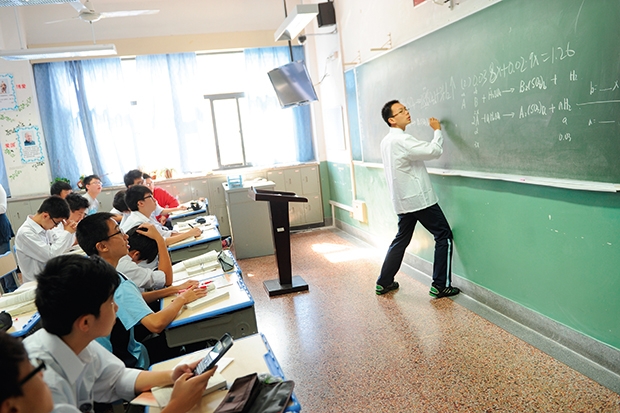In the early morning light, the sleepy students of Hengshui Senior Secondary School are putting on their tracksuits in the dimly lit dormitories. It’s 5.30 a.m. By the time lessons begin at 7.45 they have already had morning exercise, an hour of self-study and a balanced breakfast. Under a strict regime that you might think belonged at a correctional centre, the youngsters are getting ready for another day in this high-achieving school in China.
As one of the country’s ‘exam factories’, Hengshui has perfected the art of battery-farming children to produce exceptional results. A day in the life of the Hengshui student consists of a constant loop of work, rest, exercise, feed. In each day a student has ten 40-minute lessons. After dinner comes 20 minutes of TV; usually to catch up with current affairs rather than the Kardashians. After three more hours of study, books are packed up at 9.50, almost 16 hours after they were first opened. Any gossip or free time must be packed into a ten-minute gap before lights out at ten. And repeat.
As anyone who has watched the BBC show Are Our Kids Tough Enough? will know, the length and regimentation of the school day are not the only differences between the Chinese and the British systems. Unlike the interactive lessons valued by the British system, where everyone is a winner and peer comparison is discouraged for fear of upsetting the children, the Chinese system is brutal and its teachers are fierce. It isn’t the done thing to challenge this authority, which leads to a lack of critical thinking in classrooms, where the teacher and the textbooks always hold the correct answers.
The much-coveted prize of the intense system is university admission, won by succeeding in the gaokao, an annual three-day exam session. Despite their hard work, one in four children still will not make the cut. The pressure has only worsened in the last few decades, since each family now has only one child on whom to pin hopes. But high expectations are hardly new. In the past, becoming a zhuangyuan by succeeding in the imperial examinations led to positions and wealth for the scholar, and prestige for the entire family. Despite imperial China being long gone, families still see things the same way today, leading to a modern version of ruthless exam-oriented study.
Proponents of the system point out its contribution to social mobility and fairness. After all, unlike the British system of Ucas, gaokao does not reward points for extracurricular activities that not all can afford. What’s more, with each single mark determining the difference between hundreds of thousands of students, uniform marking schemes with little focus on originality of thought mean that examiners are capable of marking objectively.
But there are other ways to achieve fairness. A-level exams in this country also have uniform mark schemes within the scope of an exam board, yet allow for a more relaxed classroom atmosphere. In truth, the Chinese system is a reflection of the philosophy and culture of the country and its ruling party. For centuries, emperors have utilised the rujia teachings of Confucius to emphasise social hierarchy. Today, though they prefer to be called president instead of emperor, these values are still intact. After all, why should children be taught to challenge authority in the classroom when they won’t need this skill in society? What’s more, with the century of humiliation still a fresh wound, it is common knowledge in China that not everyone is a winner.
Of course, many children thrive in this setting. I did — having been promoted to class monitor and all-round teacher’s pet in my school in Nanjing. But my family emigrated when I was nine, so I was spared the worst of the process. My schooldays in London — often consisting of challenging teachers so much as to make them cry — couldn’t have been more different from those of my friends in China. What you’ve heard about the Chinese system is true — it is pressurised, competitive and intense. And the results are astonishing: the poorest 15-year-olds in Shanghai and Hong Kong performed better in maths, reading and science than the most privileged pupils in the UK. But when the cost is so high, I’m glad I’m not one of them.







Comments